Tag Archives: Jennifer Bort Yacovissi
2020: Reviewing a Year of Reading
Summer and Fall Reading Round-Up: History, Both Fiction and Non, Plus Hard-Boiled Crime
Book Review: The Doctor of Aleppo
Book Review: The Ghost in the House
A Love of Reading, The Gift that Keeps on Giving
Book Review: Brief but Indelible, These Two Slender Volumes Make a Big Impression
Book Review: Hurry Up and Relax
Perhaps, like me, you’re one of those people who, finding yourself in a crowd, looks around and wonders at the individual lives of each of the people surrounding you. The tattooed barista with half-shaved/half-purple hair, the guy with the sweat-stained underarms staring into the lingerie store display, the middle-aged business man shouting into his phone as though this were still 2005.
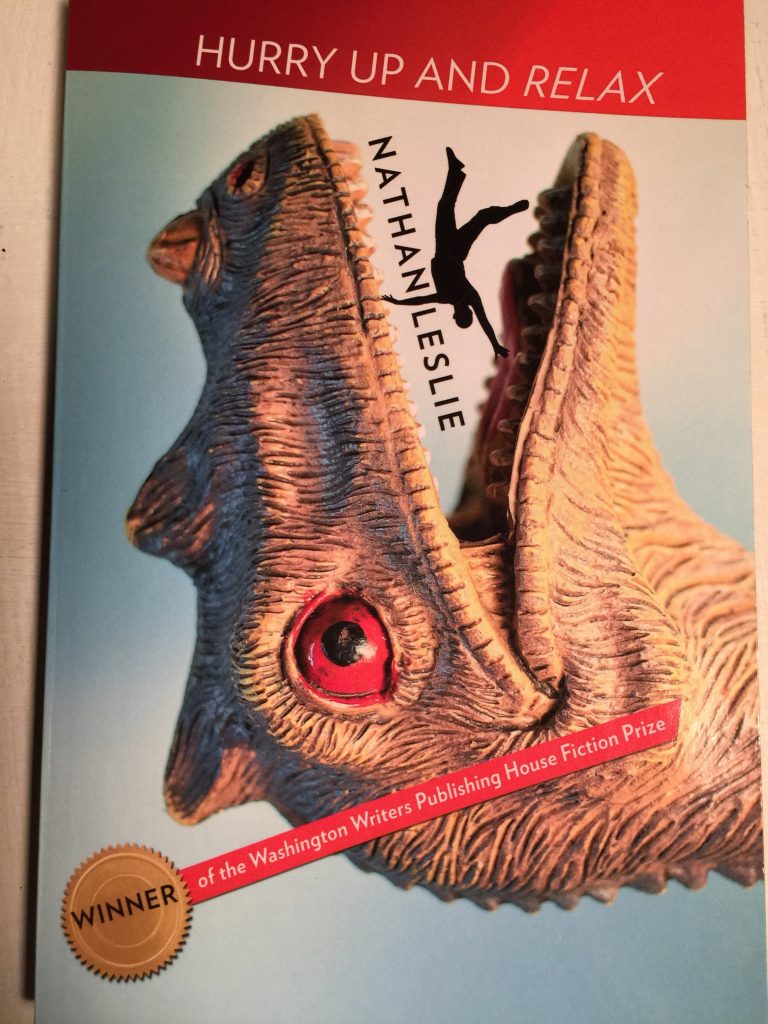
Hard as it is to imagine, all of these people have their own history, their own movie in which they star, their own universe in which they are the omnipotent point of view.
Well, Nathan Leslie imagines it. In Hurry Up and Relax—Leslie’s tenth book, coming out in October, the winner of the Washington Writers Publishing House 2019 Fiction Award—his darkly comedic eye takes in the refugees from the real estate bubble, the hostages of the gig economy, the Facebook stalkers, the Internet gamers trapped on the couch in permanent twilight.
Book Reviews: BE WITH ME ALWAYS and THE UNREPENTANT
Book Review: First Cosmic Velocity
Book Reviews: WHITE ELEPHANT and MIRACLE CREEK
Book Review: A Light of Her Own
Book Reviews: Recent Releases Ripe for Reading
One of the great joys of participating in the D.C. area writing community is getting to know so many of the exceptionally talented authors who call the area home. An added bonus is learning some of the backstory behind their work, including what it took to bring to publication. Here are two books from D.C. writers that were just released in October.
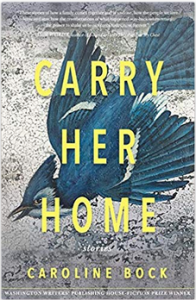 Carry Her Home, Caroline Bock, Washington Writers Publishing House, 2018, 218 pp.
Carry Her Home, Caroline Bock, Washington Writers Publishing House, 2018, 218 pp.
This collection of flash fiction and longer stories, many of which are inter-related, is fully, deliciously unexpected. From the first tiny but densely meaningful story, “The Understanding”, and the second, “O, Tomato,” which reads like prose poetry, it doesn’t take long to catch the rhythm of the stories and a sense of direction, and to realize that what remains unstated carries as much weight as what is on the page.
Book Review: Waiting for Eden
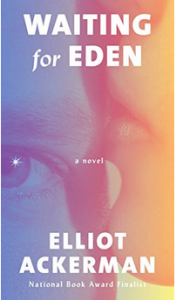 Within the first few sentences of Waiting for Eden, readers realize they are in for something out of the ordinary when the first-person narrator says matter-of-factly, “I was sitting next to Eden and luckier than him when our Humvee hit a pressure plate, killing me and everybody else, him barely surviving.”
Within the first few sentences of Waiting for Eden, readers realize they are in for something out of the ordinary when the first-person narrator says matter-of-factly, “I was sitting next to Eden and luckier than him when our Humvee hit a pressure plate, killing me and everybody else, him barely surviving.”
But out-of-the-ordinary has become the rule for the novels of Elliot Ackerman, author of the critically acclaimed debut Green on Blue, National Book Award finalist Dark at the Crossing, and now his latest, Eden, being released on September 25.
As a journalist, Ackerman was based for a number of years in Istanbul, starting in 2013, where he covered the Syrian Civil War. Among other publications, his writing has appeared in The New Yorker, The Atlantic, The New Republic, and The New York Times Magazine, and his stories have been included in The Best American Short Stories.
It’ll Soon be Time to Enjoy HARD CIDER
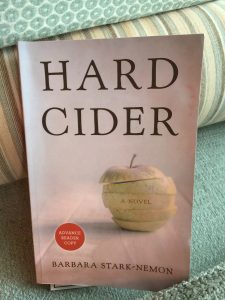 I’ve often written about my admiration of and appreciation for small, independent book publishers, those folks who are in the business much more because of their love of books than their pursuit of the next big blockbuster. Publishing these days has an ever-slimming profit margin amid fierce competition, and that makes things even more challenging for those who do this for love.
I’ve often written about my admiration of and appreciation for small, independent book publishers, those folks who are in the business much more because of their love of books than their pursuit of the next big blockbuster. Publishing these days has an ever-slimming profit margin amid fierce competition, and that makes things even more challenging for those who do this for love.
A small publisher that has drawn positive attention for its business model and a gratifying level of success is She Writes Press. In 2016, books from She Writes Press were awarded seventeen medals at the Independent Publisher Book Awards, the most awards to one press in that year. Under the guiding hand of publisher Brooke Warner, the press has gone from a catalog of eight titles in 2013 to an impressively long list for both spring and fall in this, their six year.
Little Town, Big Exposure: A Visit to the 9th Annual Gaithersburg Book Festival
Bad Weather Doesn’t Stop Book Lovers
In the opening hours of the Ninth Annual Gaithersburg Book Festival, the skies were an ugly steel gray and the precipitation shifted across mist, sprinkle, drizzle, and steady rain — and still the book lovers came out in force. Sporting umbrellas and rain ponchos, they were ready to hear their favorite authors read from and discuss books at the different literary tents, browse the new and used bookstores and independent booksellers, get their books signed while chatting with those favorite authors, grab something tasty from the food vendors, and go back again for more.
Of the many book festivals that the Baltimore-Washington area now enjoys, Gaithersburg is my personal favorite. Though it often draws over twenty thousand attendees and attracts many nationally known authors, it still has a very intimate feeling.
Short Story Collection: Don’t Wait to Be Called
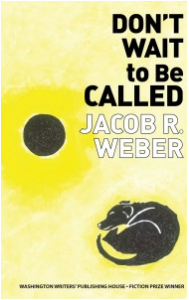 At the Washington Writers Conference coming up in May, I’ll be moderating a panel with four local authors whose debut books made it to publication through very different paths. Each book is also a different genre — memoir/journalism, biography, novel, and short story collection — which means I’m reading four very different books to prepare for the panel.
At the Washington Writers Conference coming up in May, I’ll be moderating a panel with four local authors whose debut books made it to publication through very different paths. Each book is also a different genre — memoir/journalism, biography, novel, and short story collection — which means I’m reading four very different books to prepare for the panel.
The short story collection, Don’t Wait to Be Called, is by Jacob R. Weber. Publication resulted from Weber’s winning the annual fiction prize given by Washington Writers’ Publishing House, a non-profit small press that publishes authors from the Baltimore/Washington area. Weber’s roots, which are on display in his stories, hedge towards the Baltimore end of that geography.
Weber’s biography reads like someone who has lived a few different lives, as a Marine, a translator, and an English tutor to adult immigrants, as well as a waiter and a retail clerk and manager.
A Jolt of Inspiration: How One Writer Found Her Story
Back in September in this spot, I was ruminating on the joys and sorrows of writing historical fiction, and what could possibly motivate writers to pursue such a demanding genre. Many of us are drawn to specific points of inspiration, and I mentioned D.C.-based author Carrie Callaghan‘s encounter with a painting as one example. I went back to Carrie and asked if she’d like to share in more detail what drew her to this project and what kept her hooked through long bouts of research. Here’s what she said:
I Stopped and Stared
In the painting, she’s wearing a stiff lace collar as wide as her shoulders, and fine lace cuff at her wrists. In other words, no clothes a painter would actually paint in.
NaNoWriMo: Yes or No?
 Grant Faulkner, Executive Director of NaNoWriMo, in an 11/14/17 tweet: “I just stumbled on this quote and thought it was good advice for this point in NaNoWriMo. ‘One never goes so far as when one doesn’t know where one is going.’ — Goethe . . . Sometimes you have to write as if you’re Mr. Magoo.”
Grant Faulkner, Executive Director of NaNoWriMo, in an 11/14/17 tweet: “I just stumbled on this quote and thought it was good advice for this point in NaNoWriMo. ‘One never goes so far as when one doesn’t know where one is going.’ — Goethe . . . Sometimes you have to write as if you’re Mr. Magoo.”
In a month otherwise dominated in America by Thanksgiving and the increasing notoriety/hysteria that characterizes Black Friday, NaNoWriMo has become a thing, to the point that even non-writers have heard about it. Having originated in San Francisco almost twenty years ago, National Novel Writing Month urges its participants to do one thing: write.
Yes, there are “rules”: the stated objective is for participants to write 50,000 words of a novel within a thirty-day period.
The Joys and Sorrows of (Writing) Historical Fiction
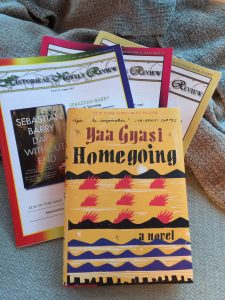 A friend of mine is an author whose favored genre is contemporary noir fiction—hard-boiled, edgy, dark. Since that’s what he writes, that’s also what he reads. Without prompting, though, he read my novel of historical fiction set in turn-of-the-twentieth-century Washington, D.C., a story that could never be described as “edgy”. Graciously, he told me what he liked about it, but concluded by saying, “I write fiction so I can make [stuff] up. Historical fiction seems like way too much work.”
A friend of mine is an author whose favored genre is contemporary noir fiction—hard-boiled, edgy, dark. Since that’s what he writes, that’s also what he reads. Without prompting, though, he read my novel of historical fiction set in turn-of-the-twentieth-century Washington, D.C., a story that could never be described as “edgy”. Graciously, he told me what he liked about it, but concluded by saying, “I write fiction so I can make [stuff] up. Historical fiction seems like way too much work.”
He’s got a point. Fiction is supposed to be fictional, right? Why go to the effort of having to do a ton of research and ensure detailed accuracy (because you know how those historical fiction fans are about that) when the story is supposed to be invented?